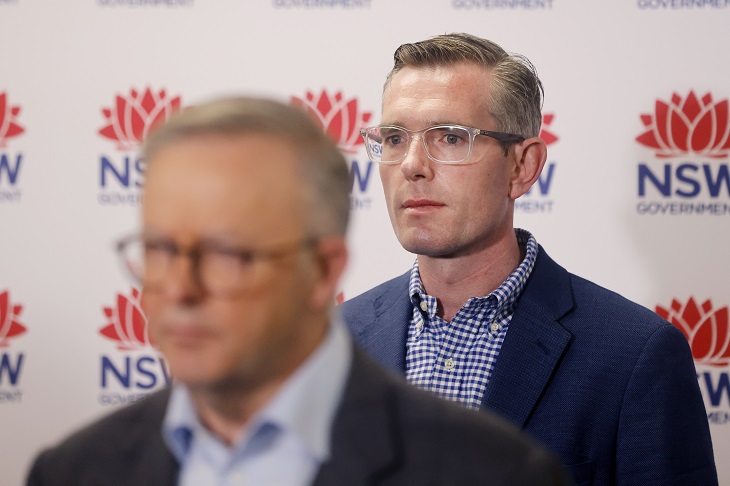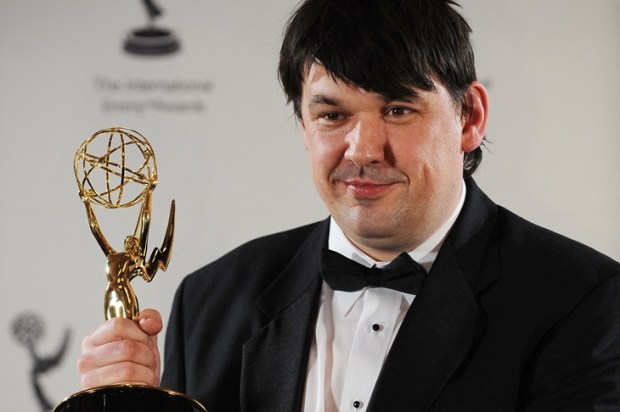Another nail in the coffin for the Liberal Party. What a travesty that we have lost New South Wales, too, to the Labor Party. Australia, other than Tasmania, is now predominantly governed by Labor. None of this surprises me.
For a long time I have been saying that we ought to choose principle over expediency every time! Unfortunately, it is a lesson that the Liberal Party continues to ignore. They are more concerned about being famous and popular than they are about standing up for what is right. Love them or loathe them, the Labor Party has always stuck to principle over expediency. Sure, the principles that they hold unto are wrong; nonetheless, they hold unto them. This means that during a debate between the government and opposition, Labor gives more credibility to their argument (policies) than the coward Liberals who continue cowing to every whim that comes their way from the media and the Left.
One only has to look at the social issues to see that Labor has never changed its position on them. The Liberals, on the other hand, would always start off as opposing them, but nearing an election, eventually and inevitably caved into them – Net Zero reductions, euthanasia, abortion, transgenderism, etc. The last time we had a Liberal leader who stuck to his principles was John Howard. And as Speccie editor Rowan Dean points out in his article, Howard won again, and again, and again. And most of his policies at the time were unpopular! But he stuck to his principles and won the argument.
Nevertheless, none of this is new. Robert Menzies had to deal with the disastrous leaders that followed him, as they kept abandoning their Party principles for the sake of expediency. Menzies accused them of being Liberals with a small ‘l’. In fact, the criticism that Menzies expressed about his successor, Harold Holt, could be applied to all recent-past and current leaders of the Liberal Party:
‘Harold was a terrific disappointment to me […] he wanted to be liked by everybody. In just every matter he could not say something that he thought somebody might dislike.
‘He didn’t realise that the job of prime minister is occasionally to be unpopular, occasionally to do things that some of his people and some of his friends don’t like.
‘The result was, of course, that never having any fibre about him, he just fell from one disaster to another.’
I am sure that had I erased the name ‘Harold’ from the quote, you would have thought this quote was about a recent or current Liberal leader. Unfortunately, the words of the German philosopher, Georg Hegel, rings true for the Liberal Party: ‘The only thing that we learn from history is that we learn nothing from history.’
Time and again, the Liberal Party had the opportunity to make a great case for the cause of liberalism whilst in government. But instead, they failed, time and again. One only has to look at the National Curriculum, the ultimate bulwark for liberalism, as an example. Sure, Alan Tudge showed some great courage; but not enough was done to ensure a purely education-based rather than indoctrination-based curriculum was implemented for the long term, regardless of who was to be in government. Now, our curriculum embraces a worldview that does not encourage learning: postmodernism. With the worldview of postmodernism denying objective truth (realism) permeating into our curriculum, we are left with a curriculum that promotes political indoctrination, as the recent IPA research has shown. We have, and will continue to have, generations that will graduate from our schools proselytised to vote Labor. This, in other words, means there will be no hope for the Liberal Party in the future unless it abandons its values (currently, not far off) and embraces socialism.
A more recent example of failing to advocate liberalism would be John Pesutto’s erroneous and anti-liberal decision to expel Moira Deeming. It goes against every fibre of liberal principles. He attacks head-on freedom of speech, thought, and association. It is a decision that embraces a quite obvious logical fallacy: guilt by association. Worst of all, it succumbs and gives credit to Dan’s premise that all people who are centre-right in their views are extreme right-wing Nazis and are not welcome in Victoria. Menzies would be outraged.
Indeed, we are no longer in the wartime generation, the background by which Menzies made the case for liberalism over John Curtin’s socialism. Nonetheless, in principle, much is the same today. The debate is still between a socialist big-daddy-government (argued by Labor, specifically, Albo and Dan) and liberalism (which ought to be argued by the Liberal Party). But, as was recently exemplified at the November 2022 election in Victoria, the Liberal Party embraced extremely social and anti-liberal policies in the last bid to win over voters, rather than focusing its attention on why the SEC and Dan Andrew’s socialism offer the wrong solutions for Victorians. The Liberal Party lost all credibility during the Covid lockdowns when it failed to advocate liberalism and instead succumbed to Labor’s socialist and utilitarian attempts at curtailing the virus. Furthermore, the bid to win over those who were angry about the vaccine mandates failed when they still supported the mandate for the healthcare sector, even though those from the sector were well-educated in their field and were better able to make their own informed decisions rather than an unqualified government! Voters were not going to be fooled.
Of course, it is easier to throw criticism rather than provide solutions. Nonetheless, the former is important for the latter. There are many lessons that must be learnt, and I think many of it can be learnt from both Robert Menzies and John Howard. Menzies had lost a few elections as leader, even after creating the Liberal Party. Australians did not always agree with him. However, he never followed the example of modern-day Liberals: he never gave up on his values and principles. Instead, he worked hard at finding other ways to make his case and win the argument. He spent time talking about his principles in practical and tangible ways, as exemplified by his Forgotten People speeches. He also made sure that all policies were aligned with the Party’s principles. But he never simply succumbed to those in government or opposition when he was the leader just because he was not always given the support either by his Party members or the Australian voters. John Howard was another example with his tax reforms. Many spoke against it; but he did not back down. Instead, he continued to stand for what he believed was right and fought hard to make his well-constructed arguments known. Eventually, the Australian voters were persuaded and gave him the mandate in 1998.
The only hope for the Liberal Party going forward is to draw the line in the sand. It needs to be a true contrast to Labor, not only in policy but now also in rhetoric. As mentioned earlier, the contrast is socialism vs. liberalism, and they need to start using those words explicitly. The remaining Liberals need to be clear and unequivocal in their position. They need to have the courage to call out the government with the explicit word, socialism. They can no longer use restrained and open words since our country is clearly heading towards socialism. Like Menzies, they need to argue why people should be worried about socialism and why liberalism is the only solution. They cannot continue to let the Labor Party get away with demonising their position, that they only care for the wealthy, not the poor. Of course, they cannot simply just deny it; they need to argue and demonstrate it. The Liberal Party needs to stop submitting to Labor’s terms and premise. They need to set the terms and premise. For example, the campaign slogan for the Voice should be: Don’t be a racist; vote no for the Voice. Observe how the first clause sets the terms and premise. It rejects Labor’s rhetoric that the Voice-opposers are racists; instead, it puts the onus on those supporting the Voice.
The Liberal Party also needs to realise that with the decline in educational performance, we are now dealing with more voters who are not critical thinkers. We are trying to win the votes of the young generation that uncritically absorbs information and propaganda via social media and its influencers. Liberals need to do more to reach out to this childless and assetless generation and argue how liberalism can benefit them; how it can support them to have a family and to affordably procure assets. They need to do similar things, like PragerU, to argue, influence, and persuade young voters via social media why liberalism is the only way for the future, and why socialism is bad and will only make them poorer.
Further, since we are dealing with an uncritical generation, we need to learn a lesson from Dan’s handbook: speak simple-stupid. People who join the Liberal Party tend to be well-educated. The Liberal Party gives voters the benefit of the doubt that they are smart enough to think for themselves. But many don’t read the details, which is how Dan gets away with a lot of nonsense. Observe the debate between Dan Andrews and Matt Guy. The former drilled into everyone’s mind how the SEC is a good thing, how it will kill greed and profit, and how it will provide tangible benefits. No matter the question or argument thrown at him, Dan came back to his simple message; he never allowed his opponent to set the terms or premise of the argument. Likewise, during the campaign, I argued that our gas policy should have been simplified to ‘Making energy cheaper’ with more details that could be read on the web – the message being simple, clear, and tangible. That is what Dan would have done because it is effective. Instead, for fear of failing to deliver in the future (even though the same details would have been on the web), the Liberal Party chose to stick to the line, ‘We will release our natural gas reserves…’ providing an ambiguous, complicated, and intangible message. We must remember the art of politics that Menzies so well embodied and exemplified:
‘The art of politics is to convey ideas to others, if possible, to persuade a majority to agree; to create or encourage a public opinion so soundly based that it endures, and is not blown aside by chance winds; to persuade people to take long-range views.’
But how can we convey these ideas when the Liberal Party no longer understands what liberalism means and what it means practically in policies? They seem to have lost the cause for liberalism.
There is hope for the Liberal Party in the future if it will listen. If it does not, then there is no hope; like the UAP, they will need to close shop. We need to learn from the past, and so I encourage every Liberal, especially those elected, to spend a lot of time at the Robert Menzies Institute, and learn about the man who embodied the Liberal Party, his experiences, and his resolutions that made him the most successful and longest-serving Prime Minister of Australia.
In other words, permeate yourselves with Menzies’ non-utilitarian liberalism. Make liberalism your cause, not the media and Left’s whims, and you will govern again, because you won the argument. You have mastered the art of politics.
Timothy Dragan was the Liberal candidate for the seat of Narre Warren North in the 2022 Victorian State election.
Got something to add? Join the discussion and comment below.
Get 10 issues for just $10
Subscribe to The Spectator Australia today for the next 10 magazine issues, plus full online access, for just $10.


























Comments
Don't miss out
Join the conversation with other Spectator Australia readers. Subscribe to leave a comment.
SUBSCRIBEAlready a subscriber? Log in